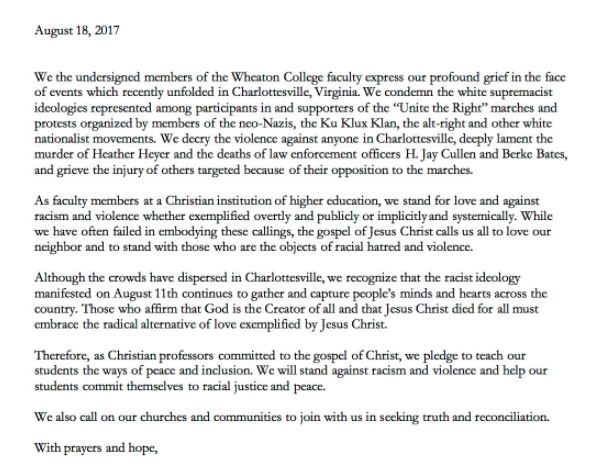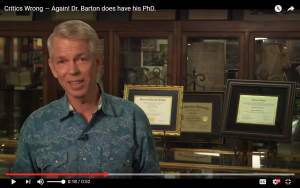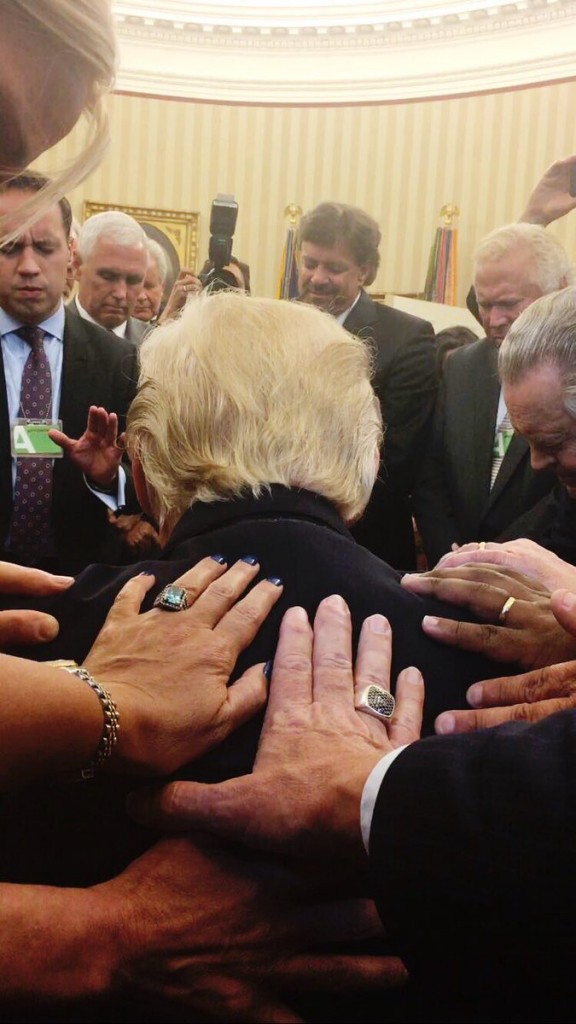I commend the Wheaton College faculty for this public statement condemning white supremacy. Over 140 faculty members signed it. You can read it here. In contrast, some alums of Liberty University have returned their diploma to the school in protest over president Jerry Falwell, Jr.’s support for Trump’s response to Charlottesville.

I agree with my professor brothers and sisters at Wheaton and add my support.
Hat tip to Jim West
Category: racism
David Barton Says Lee Wasn't a Racist and Likens Statues of Stalin to Confederate Statues

On the Joe Pags Show last Friday, David Barton likened Confederate statues as historical icons to the Holocaust ovens and Gestapo headquarters in Germany. In response to my critique of this analogy, Barton gave extended remarks to Austin American-Statesman reporter Jonathan Tilove in an article published today. In his remarks, Barton said Confederate statues were celebratory at the time they were put up in the same way statues of Stalin were celebratory. He also said Confederate General Robert E. Lee was “not a racist in any way, shape, fashion or form.”
Before I critique Barton’s statements about Stalin and Lee, let me observe that Barton clearly declared the evils of slavery and the Confederacy in this interview. While I disagree with his analogies and reasoning, I don’t think Barton intends for his defense of Confederate statues to encourage white supremacist Confederate sympathizers. Having made that important observation, I will say that his reference to Stalin doesn’t work and his defense of Lee is in line with the Lost Cause sanitizing of Lee’s life.
Stalin and Confederate Symbols
Tilove asked Barton about his comparison of Nazi atrocities and Confederate symbols. Barton didn’t address that point but pivoted to a new analogy involving Stalin. From Tilove’s article:
TILOVE
I [Tilove] asked if there wasn’t a difference between the maintaining of Nazi sites in Europe as a grim reminder and the heroic glorification of Confederate memorials.
Aren’t the Confederate memorials celebratory?
BARTON
They were for that period of time, in the same way that the Stalin statues that are still up in the Soviet Union were celebratory for him, but now you point at them and go, “Look, look at what they represented”, but that was in a period of time. They are up because they were celebrated at the time.
And there’s no doubt in my mind that every one of those Confederate heroes was celebrated at the time because of where they were, the part of the country they were in, the people that supported them, but they were racist. That’s an easy teaching lesson at this point. Or it should be.
Stalin is not a good illustration for Barton’s case. In Russia currently, Stalin is returning to a position of esteem. According to USA Today, ten new statues of Stalin has gone up since 2012. Recently, Vladimir Putin criticized the “excessive demonization” of Stalin. Stalin is a respected figure in Russia as indicated by recent polls there. Statues of Stalin were celebratory when they were put up and they are still celebratory in Russia. Barton isn’t correct that Russians look at the statues and derive some lesson about the evils of Stalinism.
Surely, Barton would not want the same result for Confederate symbols here. The Confederate statues were celebratory when erected and since the Confederacy shouldn’t be celebrated, it is past time for the monuments to come down.
Robert E. Lee
About Lee, Barton said:
TILOVE
What do you think is the appropriate approach to the Confederate memorials?
BARTON
It is kind of a case by case thing. With Robert E. Lee, I totally dislike the Confederacy, I have no sympathy for them at all. But Robert E. Lee is not a racist in any way, shape, fashion or form. He fought for Virginia, and there’s no indication of racism on his part. Now you want to go to Nathan Bedford Forrest, you bet, he’s a founder of the KKK. I’ve got all sorts of problems with him. What those guys did at Fort Pillow, the massacre there of black Union soldiers is unbelievable. So it is a case by case basis in some ways.
Barton’s statement about Lee is astounding. While some of Lee’s biographers have whitewashed his racism, other primary source evidence calls into question such a positive account. Surely Barton has read Lee’s letter to his wife dated December 27, 1856:
The views of the Pres: of the systematic & progressive efforts of certain people of the North, to interfere with & change the domestic institutions of the South, are truthfully & faithfully expressed. The consequences of their plans & purposes are also clearly Set forth, & they must also be aware, that their object is both unlawful & entirely foreign to them, their duty; for which they are irresponsible & unaccountable; & Can only be accomplished by them through the agency of a civil & servile war. In this enlightened age, there are few I believe, but what will acknowledge, that slavery as an institution is a moral & political evil in any Country. It is useless to expatiate on its disadvantages. I think it however a greater evil to the white than to the black race, & while my feelings are strongly interested in behalf of the latter, my sympathies are more strong for the former. The blacks are immeasurably better off here than in Africa, morally, socially & physically. The painful discipline they are undergoing, is necessary for their instruction as a race, & I hope will prepare & lead them to better things. How long their subjugation may be necessary is Known & ordered by a wise & merciful Providence. Their emancipation will sooner result from the mild & melting influence of Christianity, than the storms & tempests of fiery Controversy. This influence though slow is sure. The doctrines & miracles of our Saviour have required nearly two thousand years to Convert but a small part of the human race, & even Christian nations, what gross errors still exist! While we see the Course of the final abolition of human slavery is onward, & we give it the aid of our prayers & all justifiable means in our power we must leave the progress as well as the result in his hands who Sees the end; who Chooses to work by slow influences ; & with whom two thousand years are but a single day. Although the abolitionist must Know this; & must see that he has neither the right or power of operating except by moral means & suasion, & if he means well to the slave, he must not create angry feelings in the master; that although he may not approve the mode by which it pleases Providence to accomplish its purposes, the result will nevertheless be the same: that the reasons he gives for interference in what he has no Concern, holds good for every Kind of interference with our neighbours when we disapprove their Conduct; Still I fear he will persevere in his evil Course. Is it not strange that the descendants of those pilgrim fathers who crossed the Atlantic to preserve their own freedom of opinion, have always proved themselves intolerant of the spiritual liberty of others.
Lee’s version of Christianity required him to fight for African slaves stay in bondage because God willed it. God may take thousands of years to correct the situation but, for Lee, that was preferable to the work of the abolitionist. He called the abolitionist’s work an “evil Course.” Lee’s viewed African slaves as needing “painful discipline” before they could be free. This can only be described as some “shape, fashion or form” of racial superiority which Lee justified with Christianity.
Furthermore, there is primary evidence that Lee was not kind to his slaves, especially those who were caught trying to escape. On such slave, Wesley Norris, told his story in 1866. Lee was executor of the estate of his wife’s deceased father and as such administered the treatment of slaves. Norris described the beatings ordered by Lee for him and his sister. According to Norris, Lee told the overseer to “lay it on well.” I encourage readers to consult Elizabeth Brown Pryor’s book on Lee for a fuller picture of the Confederate General.
While I agree statues should be evaluated on a case by case basis, I think Barton’s view of Lee is informed more by the Lost Cause than accurate history. If Barton has evidence that Lee was not a racist nor a supporter of slavery, I encourage him to produce it.
Tilove’s post is fascinating and advances the discussion surround the monuments. I encourage you to read the whole piece.
Trump Calls Confederate Monuments Beautiful and Says Culture Ripped Apart by Removal

In a series of tweets, President Trump this morning lamented the movement to remove Confederate statues from American cities. Trump doubled down on his remarks at the press conference two days ago when he said there were good people among the Nazis and white supremacist marchers in Charlottesville.
Sad to see the history and culture of our great country being ripped apart with the removal of our beautiful statues and monuments. You…..
— Donald J. Trump (@realDonaldTrump) August 17, 2017
…can’t change history, but you can learn from it. Robert E Lee, Stonewall Jackson – who’s next, Washington, Jefferson? So foolish! Also…
— Donald J. Trump (@realDonaldTrump) August 17, 2017
…the beauty that is being taken out of our cities, towns and parks will be greatly missed and never able to be comparably replaced!
— Donald J. Trump (@realDonaldTrump) August 17, 2017
With this rhetoric, Trump echos what the League of the South and other white supremacist groups have been promoting. The movement to preserve Confederate tributes have been led by secessionist and white supremacist organizations.
I maintain that Christians should take the lead in removing these symbols from the public square.
These tweets are certain to inflame the passionate debate surrounding these symbols and encourage the white supremacist and alt-right element of his base.
This issue might get a rise from some of his evangelical advisors. When New Orleans removed Confederate statues from the public square, a former Southern Baptist Convention president signed a petition to have them removed. Fred Luter was a part of that effort.
James Robison: Are We Going to Rip Amazing Grace from Hymnal Because John Newton Was a Slave Trader?
Gateway Church apostolic elder and member of Donald Trump’s evangelical advisory board, James Robison, today asked God if Amazing Grace should be removed from the hymnbook because John Newton was a slave trader. Although he doesn’t mention Confederate statues, in a video titled, What Must We Do When All Hell Breaks Loose, Robison appears to signal his views on removing symbols of the past. Watch:
He first asks God to release healing and asks for peace, joy, and wisdom. He quickly goes to preaching and seems to debate God over Confederate symbols. At 3:38, Robison says:
We’ve made many mistakes; we have failed throughout history, but Father to go back and root up and tear down every memory, even of those who failed but perhaps were moved to positive change. Are we going to rip Amazing Grace out of every hymnbook because John Newton was a slave trader? Are we gonna go back and attack Wilberforce because he was a member of a parliament in Great Britain that once encouraged and supported slavery? Are we gonna refuse to recognize what you did in spite of our wrong when your grace moved us to respond to your wisdom and apply it? As it has happened in our country, help us to move away from the horrors of the past and the wickedness of things that were in place far too long. And thank you for the corrections that have come and stand against all hatred, all racial tension and division. Even the sectarian, and political and partisan divide. God would you move us together to be a family.
He then prays for Christians to unite and not use the Bible as a “club.” Finally, he asks his audience to trust God for a miracle.
What Does His Prayer Have to Do with Charlottesville?
While Robison didn’t mention the Charlottesville protests, his words certainly point to that context. His prayer is unusual in that he seems to make a case to God that there is a problem with rooting up symbols from the past. The symbol at issue in Charlottesville was the statue of Robert E. Lee. Although Robison didn’t defend the Lee statue directly, it seems reasonable to think he was referring to efforts to remove the statue.
The problem is that none of what Robison prayed relates directly to the Lee statue in Charlottesville. John Newton was a slave trader but did change his mind late in life and supported Wilberforce’s effort to end the slave trade. Wilberforce and the British parliament is an even further stretch for a comparable situation. Wilberforce helped bring the slave trade to an end in Britain. Despite the Lost Cause myths surrounding Lee, he wasn’t a figure who should be honored with a tribute. In any case, Lee wasn’t a hero and didn’t end up on the right side. Perhaps, Robison has been a victim of bad history.
According to Robert Morris, the pastor at Gateway, Robison has Donald Trump’s personal cell phone number and takes his calls “two or three times per week.” Perhaps Trump’s stance on this issue has been informed by Robison and those who think like him. If so, I hope someone close to Robison can educate him about Lee and the pain those Confederate symbols cause to many African-Americans.
As for me, I continue to believe Christians should get behind the movement to remove Confederate statues and tributes from the public square and place them in museums or other locations where the evils of slavery and racism are described.
Donald Trump: First Robert E. Lee, What's Next George Washington and Thomas Jefferson?
Donald Trump made the same argument that many defenders of Confederate symbols make. If we take down statues of Lee and Stonewall Jackson, what’s next Washington and Jefferson? Watch:
Trump knocks it out of the park by asking the media about whether George Washington statue is next to be removed. pic.twitter.com/g4lqy6SFYq
— The Columbia Bugle (@ColumbiaBugle) August 15, 2017
In this clip, Trump also defends participation in the Unite the Right rally if the participants weren’t white supremacists. He said there were many people who weren’t in that group at Charlottesville in the rally. This line of thought is hard to fathom.
By now, no one should be surprised. Trump’s slow and confusing initial response is consistent with his attitudes.
Trump does not have the ability to think through these things for himself. He doesn’t have the ability to reason through the differences between Robert E. Lee who was committed to slavery as a moral good for African slaves, and George Washington who freed his slaves at his death and didn’t fight a war to maintain slavery.